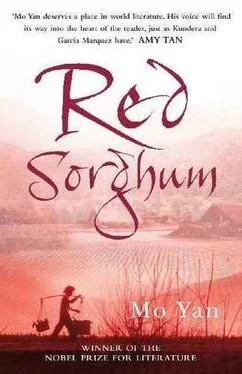Mo Yan - Red Sorghum
Здесь есть возможность читать онлайн «Mo Yan - Red Sorghum» весь текст электронной книги совершенно бесплатно (целиком полную версию без сокращений). В некоторых случаях можно слушать аудио, скачать через торрент в формате fb2 и присутствует краткое содержание. Год выпуска: 2003, Издательство: Arrow, Жанр: Современная проза, на английском языке. Описание произведения, (предисловие) а так же отзывы посетителей доступны на портале библиотеки ЛибКат.
- Название:Red Sorghum
- Автор:
- Издательство:Arrow
- Жанр:
- Год:2003
- ISBN:нет данных
- Рейтинг книги:3 / 5. Голосов: 1
-
Избранное:Добавить в избранное
- Отзывы:
-
Ваша оценка:
- 60
- 1
- 2
- 3
- 4
- 5
Red Sorghum: краткое содержание, описание и аннотация
Предлагаем к чтению аннотацию, описание, краткое содержание или предисловие (зависит от того, что написал сам автор книги «Red Sorghum»). Если вы не нашли необходимую информацию о книге — напишите в комментариях, мы постараемся отыскать её.
, a novel of family and myth, is told through a series of flashbacks that depict events of staggering horror set against a landscape of gemlike beauty, as the Chinese battle both Japanese invaders and each other in the turbulent war years of the 1930s.
A legend in China, where it won major literary awards inspired the Oscar-nominated film,
is a book in which fable and history collide to produce fiction that is entirely new and unforgettable.
Red Sorghum — читать онлайн бесплатно полную книгу (весь текст) целиком
Ниже представлен текст книги, разбитый по страницам. Система сохранения места последней прочитанной страницы, позволяет с удобством читать онлайн бесплатно книгу «Red Sorghum», без необходимости каждый раз заново искать на чём Вы остановились. Поставьте закладку, и сможете в любой момент перейти на страницу, на которой закончили чтение.
Интервал:
Закладка:
Arhat Liu played a significant role in my family’s history, but there is no hard evidence that he had an affair with my grandma, and, to tell the truth, I don’t believe it. I understood the logic of what the old clay-pot was saying, but it still embarrassed me. Since Uncle Arhat treated my father like a grandson, that would make me sort of his great-grandson; and if my great-granddad had an affair with my grandma, that’s incest, isn’t it? But that’s hogwash, since my grandma was Uncle Arhat’s boss, not his daughter-in-law, and their relationship was sealed by wages, not by blood. He was a faithful old hand who embellished the history of our family and brought it greater glory than it would have had otherwise. Whether my grandma ever loved him or whether he ever lay down beside her on the kang has nothing to do with morality. What if she did love him? I believe she could have done anything she desired, for she was a hero of the resistance, a trailblazer for sexual liberation, a model of women’s independence.
In country records I discovered that in 1938, the twenty-seventh year of the Republic, four hundred thousand mandays were spent by local workers from Gaomi, Pingdu, and Jiao counties in the service of the Japanese army to build the Jiao-Ping highway. The agricultural loss was incalculable, and the villages bordering the highway were stripped clean of draught animals. It was then that Arhat Liu, a conscript himself, took a hoe to the legs of our captured mule. He was caught, and the next day the Japanese soldiers tied him to a tethering post, skinned him alive, and mutilated him in front of his compatriots. There was no fear in his eyes, and a stream of abuse poured from his mouth up until the moment he died.
3
SHE TOLD IT exactly like it was. When construction of the Jiao-Ping highway reached our place, the sorghum in the fields was only waist-high. Except for a handful of tiny villages, two crossing rivers, and a few dozen winding dirt paths, the marshy plain, which measured sixty by seventy-odd li — or about twenty by twenty-five miles — was covered with sorghum that waved like an ocean of green. From our village we had a clear view of White Horse Mountain, an enormous rock formation on the northern edge of the plain. Peasants tending the sorghum looked up to see White Horse and down to see black soil that soaked up their sweat and filled their hearts with contentment. When they heard that the Japanese were building a highway across the plain, they grew restive, awaiting the calamity they knew was coming.
The Japanese said they would come, and they were as good as their word.
My father was sleeping when the Japs and their puppet soldiers came to our village to conscript peasant labourers and confiscate their mules and horses. He was awakened by a disturbance near the distillery. Grandma dragged him over to the compound as fast as her bamboo-shoot feet would carry her. Back then there were a dozen or so huge vats in the compound, each brimming with top-quality white liquor, the aroma of which hung over the entire village. Two khaki-clad Japanese soldiers with fixed bayonets stood there as a couple of black-clad Chinese, rifles slung over their backs, untied our two big black mules from a catalpa tree. Uncle Arhat kept trying to get to the shorter puppet soldier, who was untying the tethers, but the taller comrade forced him back with the muzzle of his rifle. Since Uncle Arhat was wearing only a thin shirt in the early-summer heat, his exposed chest already showed a welter of circular bruises.
‘Brothers,’ he pleaded, ‘we can talk this over, we can talk it over.’
‘Get the hell out of here, you old bastard,’ the taller soldier barked.
‘Those animals belong to the owner,’ Uncle Arhat said. ‘You can’t take them.’
The puppet soldier growled menacingly, ‘If I hear another word out of you, I’ll shoot your little prick off!’
The Japanese soldiers stood like clay statues, holding their rifles in front of them.
As Grandma and my father entered the compound, Uncle Arhat wailed, ‘They’re taking our mules!’
‘Sir,’ Grandma said, ‘we’re good people.’
The Japanese squinted and grinned at her.
The shorter puppet soldier freed the mules and tried to lead them away; but they raised their heads stubbornly and refused to budge. His buddy walked up and prodded one of them in the rump with his rifle; the angered animal pawed the ground with its rear hooves, its metal shoes glinting in the mud that sprayed the soldier in the face.
The tall soldier pointed his rifle at Uncle Arhat and bellowed, ‘Come over here and take these mules to the construction site, you old bastard!’
Uncle Arhat squatted on the ground without making a sound, so one of the Japanese soldiers walked up and waved his rifle in front of Uncle Arhat’s face. ‘ Minliwala, yalalimin !’ he grunted. With the shiny bayonet glinting in front of his eyes, Uncle Arhat sat down. The soldier thrust his bayonet forward, opening a tiny hole in Uncle Arhat’s shiny scalp.
Beginning to tremble, Grandma blurted out, ‘Do it, Uncle, take the mules for them.’
The other Jap soldier edged up close to Grandma, and Father noticed how young and handsome he was, and how his dark eyes sparkled. But when he smiled, his lip curled to reveal yellow buck teeth. Grandma staggered over to Uncle Arhat, whose wound was oozing blood that spread across his scalp and down his face. The grinning Japanese soldiers drew closer. Grandma laid her hands on Uncle Arhat’s scalp, then rubbed them on her face. Pulling her hair, she leaped to her feet like a madwoman, her mouth agape. She looked three parts human and seven parts demon. The startled Japanese soldiers froze.
‘Sir,’ the tall puppet soldier said, ‘that woman’s crazy.’
One of the Jap soldiers mumbled something as he fired a shot over Grandma’s head. She sat down hard and began to wail.
The tall puppet soldier used his rifle to prod Uncle Arhat, who got to his feet and took the tethers from the smaller soldier. The mules looked up; their legs trembled as they followed him out of the compound. The street was chaotic with mules, horses, oxen, and goats.
Grandma wasn’t crazy. The minute the Japs and the puppet soldiers left, she removed the wooden lid from one of the wine vats and looked at her frightful, bloody reflection in the mirrorlike surface. Father watched the tears on her cheeks turn red. She washed her face in the wine, turning it red.
Like the mules he was leading, Uncle Arhat was forced to work on the road that was taking shape in the sorghum field. The highway on the southern bank of the Black Water River was nearly completed, and cars and trucks were driving up on the newly laid roadway with loads of stone and yellow gravel, which they dumped on the riverbank. Since there was only a single wooden span across the river, the Japanese had decided to build a large stone bridge. Vast areas of sorghum on both sides of the highway had been levelled, until the ground seemed covered by an enormous green blanket. In the field north of the river, where black soil had been laid on either side of the road, dozens of horses and mules were pulling stone rollers to level two enormous squares in the sea of sorghum. Men led the animals back and forth through the field, trampling the tender stalks, which had been bent double by the shod hooves, then flattening them with stone rollers turned dark green by the plant juices. The pungent aroma of green sorghum hung heavily over the construction site.
Uncle Arhat, who was sent to the southern bank of the river to haul rocks to the other side, reluctantly handed the mules over to an old geezer with festering eyes. The little wooden bridge swayed so violently it seemed about to topple as he crossed to the southern bank, where a Chinese overseer tapped him on the head with a purplish rattan whip and said, ‘Start lugging rocks to the other side.’ Uncle Arhat rubbed his eyes — the blood from his scalp wound had soaked his eyebrows. He picked up an average-sized rock and carried it to the other side, where the old geezer stood with the mules. ‘Use them sparingly,’ he said. ‘They belong to the family I work for.’ The old geezer lowered his head numbly, then turned and led the mules over to where teams of animals were working on the connecting road. The shiny rumps of the black mules reflected specks of sunlight. His head still bleeding, Uncle Arhat hunkered down, scooped up some black dirt, and rubbed it on the wound. A dull, heavy pain travelled all the way down to his toes.
Читать дальшеИнтервал:
Закладка:
Похожие книги на «Red Sorghum»
Представляем Вашему вниманию похожие книги на «Red Sorghum» списком для выбора. Мы отобрали схожую по названию и смыслу литературу в надежде предоставить читателям больше вариантов отыскать новые, интересные, ещё непрочитанные произведения.
Обсуждение, отзывы о книге «Red Sorghum» и просто собственные мнения читателей. Оставьте ваши комментарии, напишите, что Вы думаете о произведении, его смысле или главных героях. Укажите что конкретно понравилось, а что нет, и почему Вы так считаете.












